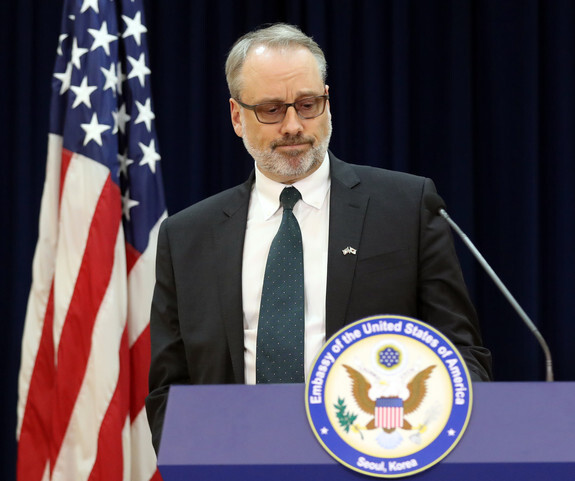hankyoreh
Links to other country sites 다른 나라 사이트 링크
[Editorial] US needs to seek a reasonable defense cost-sharing compromise rather than cranking up pressure tactics

The US military notified its South Korean employees on Jan. 28 that they may be put on unpaid leave in April, given the two countries’ continuing failure to reach a deal on their defense cost-sharing agreement. The measure, US Forces Korea (USFK) explained, was taken in accordance with American law, which requires that employees be given 60 days’ notice before they’re put on furlough. But given the public nature of this notification, which was made right when the negotiations are at an impasse, it’s very regrettable that the US is restoring to such tactics to gain the upper hand in the negotiations and to crank up the pressure on South Korea.
Most of the wages for the 9,000 South Korean employees of USFK are covered by the cost-sharing agreement, known as the Special Measures Agreement (SMA). At first blush, therefore, the argument that the wages of those employees can’t be paid if the SMA lapse drags on during a deadlock in the negotiations would appear to be valid. But it’s dishonest to talk about furloughing workers without acknowledging that the negotiations — which were supposed to be concluded by the end of last year — have been stalled by the US government’s demand for an unreasonable hike in South Korea’s financial contribution.
While the US has apparently lowered its demand from the original figure of US$5 billion, it still holds that Seoul should shoulder an excessive increase. A few weeks ago, US Secretary of State Mike Pompeo and Secretary of Defense Mark Esper co-authored an op-ed titled “South Korea is an ally, not a dependent,” openly pressuring Seoul to pay more for its defense. In the working-level negotiations themselves, reports indicate that the US delegation is still disregarding the ostensible purpose of South Korea’s defense cost-sharing — namely, to cover the cost of stationing US troops in the country — and is pushing strongly for unrelated “readiness costs,” including the cost of rotational troop deployment, training exercises, and equipment. Before forcing South Korean workers to go on unpaid leave on the pretext that negotiators have failed to reach a deal, the US government and military ought to give up such absurd demands and try reaching a more reasonable agreement.
The administration of Donald Trump seriously needs to consider that its excessive demands are even being criticized within the US. “The Administration's fixation on its notion of burden-sharing belies a fundamental misunderstanding of the value of our alliance with the Republic of Korea [South Korea],” the ranking Democrats on the Senate Foreign Relations Committee and the Armed Services Committee wrote in a joint letter on Jan. 28. Concerns were also raised in a House hearing that the administration seems focused not on the value of the alliance but solely on the cost of the US troop presence.
It wouldn’t be in the interests of either country for the SMA lapse to be prolonged because of a stalemate in the negotiations. Before it’s too late, the Trump administration needs to offer a reasonable and practical draft of the agreement, one that would be acceptable to both sides.
Please direct comments or questions to [english@hani.co.kr]

Editorial・opinion
![[Column] Season 2 of special prosecutor probe may be coming to Korea soon [Column] Season 2 of special prosecutor probe may be coming to Korea soon](https://flexible.img.hani.co.kr/flexible/normal/500/300/imgdb/original/2024/0426/3317141030699447.jpg) [Column] Season 2 of special prosecutor probe may be coming to Korea soon
[Column] Season 2 of special prosecutor probe may be coming to Korea soon![[Column] Park Geun-hye déjà vu in Yoon Suk-yeol [Column] Park Geun-hye déjà vu in Yoon Suk-yeol](https://flexible.img.hani.co.kr/flexible/normal/500/300/imgdb/original/2024/0424/651713945113788.jpg) [Column] Park Geun-hye déjà vu in Yoon Suk-yeol
[Column] Park Geun-hye déjà vu in Yoon Suk-yeol- [Editorial] New weight of N. Korea’s nuclear threats makes dialogue all the more urgent
- [Guest essay] The real reason Korea’s new right wants to dub Rhee a founding father
- [Column] ‘Choson’: Is it time we start referring to N. Korea in its own terms?
- [Editorial] Japan’s rewriting of history with Korea has gone too far
- [Column] The president’s questionable capacity for dialogue
- [Column] Are chaebol firms just pizza pies for families to divvy up as they please?
- [Column] Has Korea, too, crossed the Rubicon on China?
- [Correspondent’s column] In Japan’s alliance with US, echoes of its past alliances with UK
Most viewed articles
- 1Is Japan about to snatch control of Line messenger from Korea’s Naver?
- 2‘We must say no’: Seoul defense chief on Korean, USFK involvement in hypothetical Taiwan crisis
- 3[News analysis] Using lure of fame, K-entertainment agency bigwigs sexually prey on young trainees
- 4[Column] Park Geun-hye déjà vu in Yoon Suk-yeol
- 5Will NewJeans end up collateral damage in internal feud at K-pop juggernaut Hybe?
- 6Up-and-coming Indonesian group StarBe spills what it learned during K-pop training in Seoul
- 7[Column] Season 2 of special prosecutor probe may be coming to Korea soon
- 8Korea’s 1.3% growth in Q1 signals ‘textbook’ return to growth, says government
- 9Report reveals toxic pollution at numerous USFK bases
- 10[Editorial] Statue should not be central concern of comfort women issue